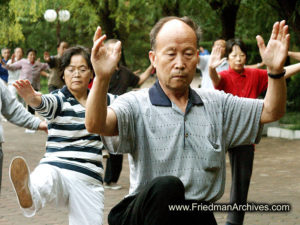Strengthen the Brain to Prevent Aging Cognitive Decline with Tai Chi
By John M. de Castro, Ph.D.
“Another great benefit of Tai Chi is that it’s accessible to people of all ages and fitness abilities. It’s the focus on the subtle movements that exercise the brain and boost cognitive abilities.” – Karl Romain
Human life is one of constant change. We revel in our increases in physical and mental capacities during development, but regret their decreases during aging. The aging process involves a systematic progressive decline in every system in the body, the brain included. This includes our mental abilities which decline with age including impairments in memory, attention, and problem solving ability. It is inevitable and cannot be avoided. Using modern neuroimaging techniques, scientists have been able to view the changes that occur in the nervous system with aging. In addition, they have been able to investigate various techniques that might slow the process of neurodegeneration that accompanies normal aging. They’ve found that mindfulness practices reduce the deterioration of the brain that occurs with aging restraining the loss of neural tissue. Indeed, the brains of practitioners of meditation and yoga have been found to degenerate less with aging than non-practitioners.
Hence, there is some hope for age related cognitive decline, as there is evidence that it can be slowed. There are some indications that physical and mental exercise can reduce the rate of cognitive decline and lower the chances of dementia. For example, contemplative practices such as meditation, yoga, and Tai Chi and Qigong have all been shown to be beneficial in slowing or delaying physical and mental decline with aging. Mindfulness practices have been shown to improve cognitive processes while gentle mindful exercises such as Tai Chi and Qigong have been shown to slow age related cognitive decline. Although the mindful movement practice of Tai Chi has been shown to slow cognitive decline, it is not known what neural systems are involved.
In today’s Research News article “Tai Chi Chuan and Baduanjin practice modulates functional connectivity of the cognitive control network in older adults.” See summary below or view the full text of the study at: https://www.ncbi.nlm.nih.gov/pmc/articles/PMC5294576/
Tao and colleagues study the effects of the mindful movement practices of Tai Chi and Baduanjin, a simplified version of Tai Chi, on neural systems and cognitive processes. They recruited older adults (50-70 years of age) and assigned them to 12 weeks of Tai Chi practice, Baduanjin practice, or health education. Before and after training, they were subjected to functional Magnetic Resonance Imaging (f-MRI) scanning of their brains and were measured for mental control.
They found that after the practice period, both the Tai Chi and Baduanjin practice groups had significantly superior mental control than the control group. Thus, the mindful movement groups were better able to comprehend and maintain task demands over a period of time. In addition, they found that Tai Chi group showed a significant decrease in functional connectivity between the dorsolateral prefrontal cortex and the left superior frontal gyrus and anterior cingulate cortex; and the Baduanjin group showed a significant decrease in functional connectivity between the dorsolateral prefrontal cortex and the left putamen and insula. Hence, the mindful movement practices altered the brain in the areas responsible for high level cognitive processes while improving cognitive control. The association between the neural and mental changes was reflected in the fact that the greater the change in functional connectivity between the dorsolateral prefrontal cortex and the putamen, the greater the change in mental control.
These results are interesting and in line with prior findings that mindfulness practices alter the nervous system in regions responsible for higher mental processes. They demonstrate that mindful movement practices also do this and at the same time improve the individual’s ability to comprehend and maintain task demands over a period of time, mental control. These practices produce these changes in older individuals. This suggests that Tai Chi may be an effective practice to restrain cognitive decline in aging individual.
So, strengthen the brain to prevent aging cognitive decline with Tai Chi.
“elderly people practising Tai Chi – an ancient Chinese form of slow, meditative exercise – just three times a week can boost brain volume and improve memory and thinking.” – The Telegraph
CMCS – Center for Mindfulness and Contemplative Studies
This and other Contemplative Studies posts are also available on Google+ https://plus.google.com/106784388191201299496/posts and on Twitter @MindfulResearch
Study Summary
Tao, J., Chen, X., Egorova, N., Liu, J., Xue, X., Wang, Q., … Kong, J. (2017). Tai Chi Chuan and Baduanjin practice modulates functional connectivity of the cognitive control network in older adults. Scientific Reports, 7, 41581. http://doi.org/10.1038/srep41581
Abstract
Cognitive impairment is one of the most common problem saffecting older adults. In this study, we investigated whether Tai Chi Chuan and Baduanjin practice can modulate mental control functionand the resting state functional connectivity (rsFC) of the cognitive control network in older adults. Participants in the two exercise groups practiced either Tai Chi Chuan or Baduanjin for 12 weeks, and those in the control group received basic health education. Memory tests and fMRI scans were conducted at baseline and at the end of the study. Seed-based (bilateral dorsolateral prefrontal cortex, DLPFC) rsFC analysis was performed. We found that compared to the controls, 1) both Tai Chi Chuan and Baduanjin groups demonstrated significant improvements in mental control function; 2) the Tai Chi Chuan group showed a significant decrease in rsFC between the DLPFC and the left superior frontal gyrus (SFG) and anterior cingulate cortex; and 3) the Baduanjin group showed a significant decrease in rsFC between the DLPFC and the left putamen and insula. Mental control improvement was negatively associated with rsFC DLPFC-putamen changes across all subjects. These findings demonstrate the potential of Tai Chi Chuan and Baduanjin exercises in preventing cognitive decline.
https://www.ncbi.nlm.nih.gov/pmc/articles/PMC5294576/

One thought on “Strengthen the Brain to Prevent Aging Cognitive Decline with Tai Chi”